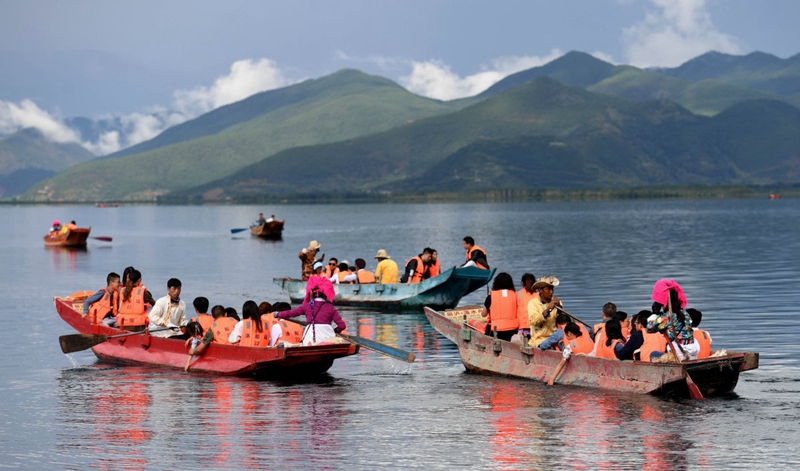
Tourists row boats on Lugu Lake in Lijiang, Yunnan province. LIN YIGUANG/XINHUA
Naka Drolma, 47, runs a guesthouse. She is also in charge of almost everything around her hotel, which sits next to Lugu Lake in Lijiang, Yunnan province.
Three times a day, she sweeps roads, empties trash and collects garbage on the greenbelts around the hotel, her zone of responsibility. She also guarantees that cars in her zone are parked in an orderly manner, and she reports damaged public facilities and potential dangers to the local authorities.
"With the guidance of the local government, public awareness of environmental protection around the lake has increased in recent years," she said. "Everyone is taking action to protect our homeland."
Last year, the local government signed liability statements with 230 households and hotel operators around the lake, including Naka Drolma, prescribing their duties and zones of responsibility in an effort to mobilize the public to protect the lake.
"We want to have more people involved so that the protection work can be more effectively and extensively carried out," said Ruan Xuewu, deputy director of the administrative bureau of Lugu Lake.
Located at the junction of Yunnan and Sichuan provinces, Lugu Lake is the highest lake in Yunnan at about 2,700 meters above sea level and surrounded by forest-clad mountains. Known as a sparkling pearl embedded in the high country, it plays a key role in balancing the local environment.
"The water is crystal clear. You can always see its bottom. In the past, we drank water directly from the lake," Naka Drolma said.
She has witnessed major changes around the lake brought about by tourism. Fascinated by the lake's natural beauty, millions of tourists swarm into the area every year.
"Ever since it became a hot spot, hotels, restaurants and bars have been built everywhere, some of which discharged large quantities of waste directly into the lake, threatening its ecology," she said. "Excessive human activity has disrupted the harmonious balance between humans and nature."
To protect the lake, the central government and Yunnan provincial authorities have implemented a series of measures to restore its lost splendor.
Buildings within a radius of 80 meters of the lake began to move out last year, and ecological rehabilitation has been undertaken. The 160 households in the radius are expected to be relocated to areas with similar geographical conditions and cultural atmosphere by the end of this year.
"We understand the policy. Only when Lugu Lake is well protected can we develop a sustainable tourism industry," Naka Drolma said.
Lijiang has built 45 kilometers of pollution collection facilities along the banks of the lake, capable of treating about 4,000 metric tons of wastewater daily.
Around 13.5 square kilometers along the shore have been restored, and more than 133 hectares of trees and shrubs have been planted.
In January, Yunnan and Sichuan issued a joint environmental protection plan for the lake, establishing a joint patrol and supervision system and a "lake chief" mechanism. The chief's responsibilities include water protection, pollution prevention and control and ecological restoration in the basin.
These joint efforts have already begun to pay off. Water quality in the lake has been maintained at Grade I for years - the highest level in China's water grading system.
"The protection of Lugu Lake needs persistence. It's not only the treasure of Lijiang, but also nature's precious gift to mankind. Everyone is responsible for protecting it and making it better," administrator Ruan said.
|






7740f3b5-9ecb-438e-9052-76cb2d4bb671.jpg)

